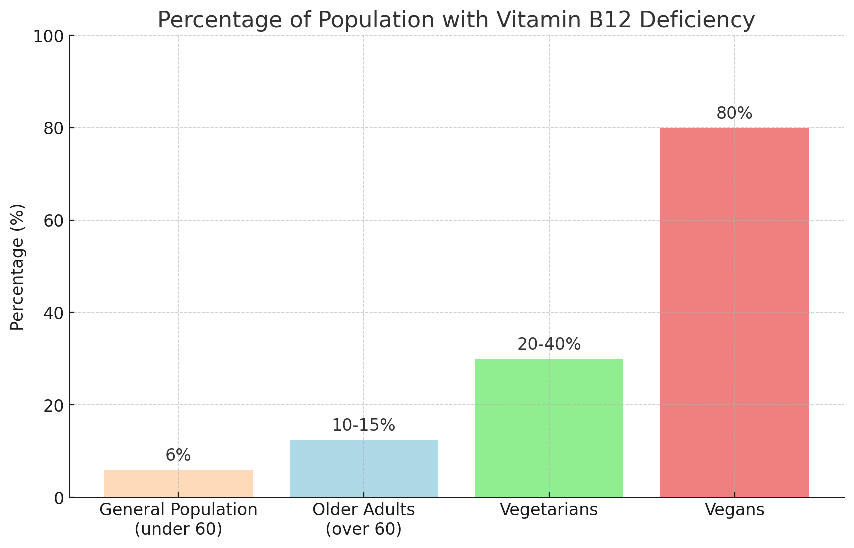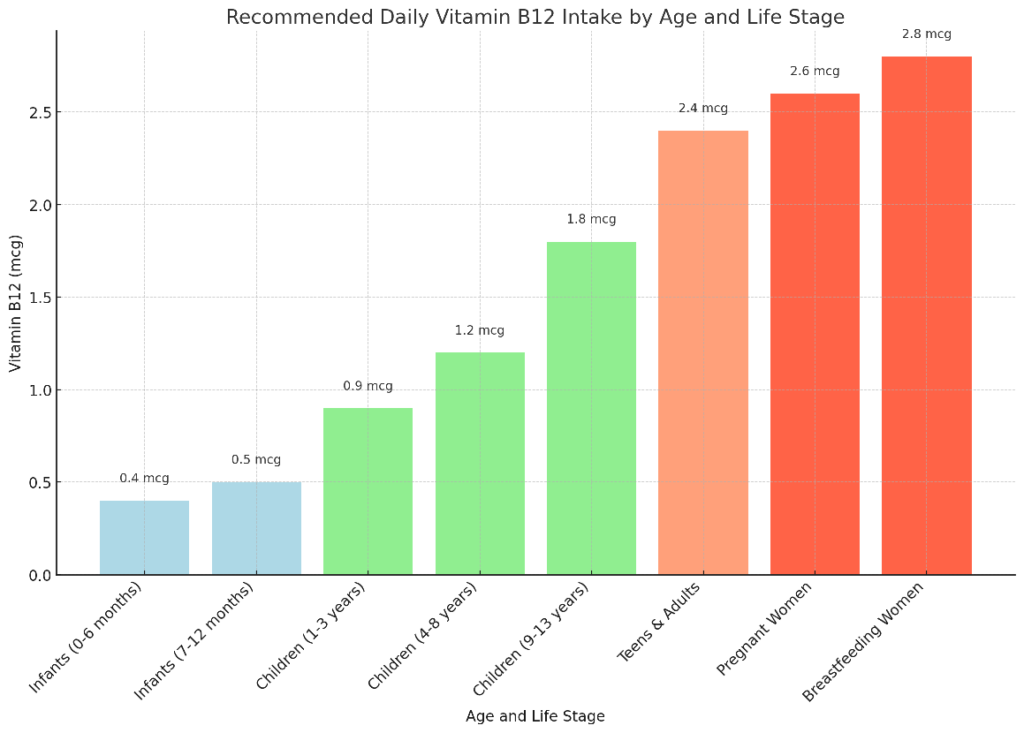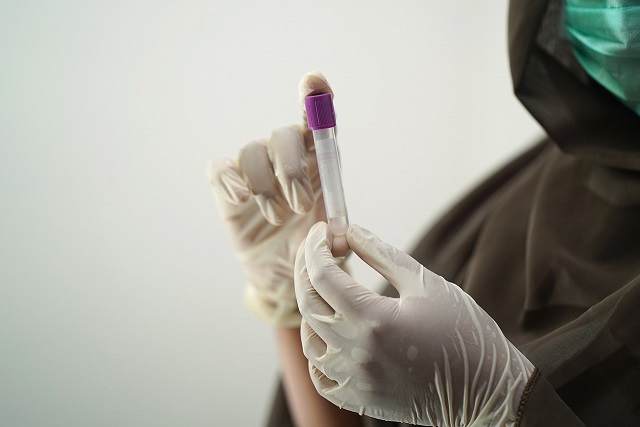Vitamin B12, or cobalamin, is a water-soluble vitamin essential for many important functions in the body. It plays a key role in producing red blood cells, synthesizing DNA, and keeping nerve cells healthy.
What is Vitamin B12 deficiency?
Vitamin B12 deficiency occurs when the body lacks sufficient levels of Vitamin B12. This vitamin is not produced in the body, it has to be included in the diet to meet the dietary requirements. Vitamin B12 deficiency occurs when there is dietary insufficiency or due to incomplete absorption of this vitamin.
Sources of Vitamin B12
Vitamin B12 is primarily found in animal-based foods. Key sources include:

- Meat: Beef, pork, and lamb are rich in Vitamin B12.
- Poultry: Chicken and turkey provide substantial amounts of this vitamin.
- Fish and Seafood: Fish like salmon, trout, and tuna, as well as shellfish such as clams, oysters, and crabs, are excellent sources.
- Dairy Products: Milk, cheese, and yogurt contain Vitamin B12.
- Eggs: Particularly the yolks, which provide Vitamin B12.
For those following a plant-based diet, Vitamin B12 can be obtained from:
- Fortified Foods: Some plant-based milks, breakfast cereals, and nutritional yeast are fortified with Vitamin B12.
- Supplements: Vitamin B12 supplements are available for those who may not get enough from dietary sources.

Including these sources in your diet can help ensure adequate Vitamin B12 intake.
How does the body absorb Vitamin B12?
The absorption of vitamin B12 is a multi-step process involving several organs.
- Once food sources containing Vitamin B12 are consumed, hydrochloric acid and the digestive enzymes in the stomach help to release the vitamin from the food proteins.
- Vitamin then binds with a protein called intrinsic factor, which is produced by the cells in the stomach lining. This binding is essential for the absorption process.
- Vitamin B12-intrinsic factor complex then travels to the ileum of the small intestine, where it binds to the receptors on the intestinal walls.
- After binding, it is now absorbed into the bloodstream and transported to various parts of the body.
- Excess Vitamin B12 is stored primarily in the liver for future use.
This process ensures that Vitamin B12 is properly absorbed and utilized by the body.
Importance of Vitamin B12 in Overall Health
Vitamin B12 is critical for maintaining several aspects of health:
- Vitamin B12 helps in the formation and maturation of red blood cells in the bone marrow. Deficiency of this vitamin leads to megaloblastic anemia which is characterized by large red blood cells.
- Vitamin B12 is essential for the synthesis of DNA, which is necessary for cell division and overall growth. Proper DNA replication ensures that cells are formed correctly, supporting healthy bodily functions.
- Vitamin B12 is vital for maintaining the health of the nervous system. It is involved in the production of myelin, the protective covering of nerve fibers. Adequate levels are essential to prevent neurological symptoms like numbness, tingling, and coordination issues.
- Adequate Vitamin B12 levels are linked to cognitive health and mental clarity. Deficiency can contribute to mood swings, memory issues, and cognitive decline.
What are the symptoms of Vitamin B12 deficiency
Vitamin B12 deficiency can manifest through a range of symptoms, including:
- Fatigue and Weakness: A common early sign, caused by the body’s inability to produce enough healthy red blood cells.
- Pale or Jaundiced Skin: A deficiency can lead to pale skin or jaundice due to the breakdown of red blood cells.
- Neurological Issues: Symptoms such as numbness, tingling, and difficulty walking can occur because of impaired nerve function.
- Cognitive and Mood Changes: Memory problems, confusion, and mood swings, including depression and irritability, may be experienced.
- Gastrointestinal Symptoms: Loss of appetite, weight loss, and digestive issues like nausea or diarrhea can be related to Vitamin B12 deficiency.
- Glossitis and Mouth Ulcers: Inflammation of the tongue and sores in the mouth may also be signs of a deficiency.
- Breathlessness and Dizziness: Reduced oxygen-carrying capacity of the blood can lead to these symptoms.
How common is Vitamin B12 deficiency?

What causes vitamin B12 deficiency?
- Vegetarian or Vegan Diets: Vitamin B12 is primarily found in animal products, those following vegetarian or vegan diets are at a higher risk of deficiency unless they consume fortified foods or supplements.
- Pernicious Anemia: This autoimmune condition affects the stomach’s ability to produce intrinsic factor, a protein necessary for Vitamin B12 absorption.
- Gastrointestinal Disorders: Conditions like Crohn’s disease, celiac disease, or atrophic gastritis can impair the absorption of Vitamin B12 in the digestive tract.
- Surgery: Procedures like gastric bypass surgery can reduce the stomach’s capacity to absorb Vitamin B12.
- Proton Pump Inhibitors (PPIs) and Antacids: Long-term use of these medications can reduce stomach acid production, which is necessary for releasing Vitamin B12 from food.
- Metformin: Used to treat type 2 diabetes, metformin can interfere with Vitamin B12 absorption in some individuals.
- Age-Related Factors: As people age, the production of stomach acid tends to decrease, which can lead to reduced absorption of Vitamin B12.
- Alcoholism: Chronic alcohol consumption can damage the stomach lining and interfere with the absorption of Vitamin B12.
How much vitamin do you need daily?
The daily requirement of Vitamin B12 varies by age and life stage. Here are the general recommendations for daily Vitamin B12 intake according to WHO nutrition:

How is vitamin B12 deficiency diagnosed?
Complete blood count(CBC)
A Complete Blood Count (CBC) can suggest Vitamin B12 deficiency by showing macrocytic anemia (large red blood cells) and elevated mean corpuscular volume (MCV). However, it’s not definitive for diagnosing Vitamin B12 deficiency.

Serum Vitamin B12 Test
This is the primary test to check vitamin B12 in blood. Normal ranges can vary slightly depending on the lab, but typically, serum Vitamin B12 levels below 200-250 picograms per milliliter (pg/mL) are considered low and may indicate a deficiency.
How is vitamin B12 deficiency treated?
Vitamin B12 deficiency is treated through supplements and addressing the underlying cause:
- Oral capsules: If vitamin B12 deficiency is due to dietary issues, vitamin B12 in the form of oral capsules can be helpful to restore normal value.
- Intramuscular injections: If the deficiency is severe, injections are often used to raise the vitamin B12 level quickly. Initially, injections are typically administered more frequently (e.g., weekly or bi-weekly) to correct the deficiency. After the deficiency is corrected, the frequency of injections may be reduced to a maintenance dose depending on the individual’s needs and response to treatment.
- Dietary Changes: Increasing intake of Vitamin B12-rich foods (like meat, dairy products, and eggs) can help. For vegetarians or vegans, fortified foods or supplements may be necessary.
- Treating Underlying Conditions: If the deficiency is due to an underlying condition like pernicious anemia or gastrointestinal issues, treating the primary condition is crucial.
How to prevent Vitamin B12 deficiency?
To prevent Vitamin B12 deficiency:
- Eat Vitamin B12-rich foods that include meat, dairy, eggs, or fortified foods in your diet.
- Take supplements if needed, especially for those with dietary restrictions or absorption issues.
- Regular blood tests can help detect low Vitamin B12 levels early, especially for those at higher risk.
- Address any health issues such as pernicious anemia or gastrointestinal disorders. that affects absorption.
Conclusion
Vitamin B12 deficiency can result from inadequate dietary intake, absorption problems, or certain medical conditions.
- Symptoms include fatigue, weakness, pale skin, numbness, difficulty walking, and cognitive issues.
- Diagnosis typically involves blood tests to measure Vitamin B12 levels, with additional tests for confirmation.
- Treatment usually includes oral supplements or injections and addressing underlying causes. Maintaining adequate Vitamin B12 is essential for energy, neurological health, and red blood cell production. If you suspect a deficiency or are at risk, consult a healthcare provider.
- Regular monitoring and a balanced diet can help prevent deficiency and support overall health.
FAQs
What are the symptoms of low B12?
Symptoms include pale skin, feeling tired, weakness, tingling or numbness and cognitive issues
How can I raise my B12 levels fast?
Include beef, liver ,chicken , sea fish, fortified cereals and dairy products in your diet. Oral capsules are available to increase your vitamin B12. If your levels are very low, intramuscular injections will be more helpful.
Can B12 deficiency be cured?
Yes, Vitamin B12 deficiency can be easily cured with oral supplements, injections, dietary changes, and treatment of underlying conditions. Regular follow-up with a healthcare provider ensures effective management.
How can I check my Vitamin B12 level at home?
To check Vitamin B12 level, home test kits are available that involve collecting a small blood sample using finger prick, which you send to a lab for analysis. Follow the kit’s instructions for accurate results.
Can I take Vitamin B12 supplements without a doctor?
It’s best to consult a healthcare provider before starting any supplementation. They can help determine the appropriate dosage, assess underlying health issues, and ensure it’s safe for you.
What happens if I take Vitamin B12 daily?
Taking Vitamin B12 daily helps maintain or correct levels, supports energy, and neurological function. It is generally safe, with excess amounts excreted in urine. Consult a healthcare provider if you have specific health concerns.
Do Vitamin B12 tablets have any side effects?
Vitamin B12 tablets are usually safe but may cause mild digestive issues like nausea or stomach upset. Consult a healthcare provider if you have concerns.
What are the worst symptoms of vitamin B12 deficiency?
Severe Vitamin B12 deficiency symptoms include neurological issues (numbness, balance problems), severe anemia (extreme fatigue), mental health changes, glossitis (inflamed tongue), and vision problems.
Will Vitamin B12 increase hemoglobin?
Yes, correcting Vitamin B12 deficiency can increase hemoglobin levels. Vitamin B12 is essential for red blood cell production, and deficiency often leads to anemia. Once B12 levels are restored through supplements or injections, hemoglobin levels typically rise as red blood cell production improves.